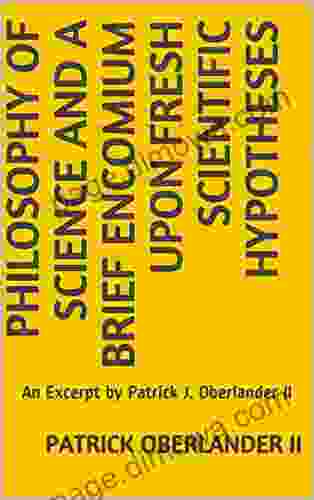An Excerpt By Patrick Oberlander Ii

In his book, An Excerpt By Patrick Oberlander Ii, the author takes us on a journey through the world of artificial intelligence (AI). He explores the history of AI, the different types of AI, and the potential benefits and risks of AI. Along the way, he provides insights from leading experts in the field and shares his own thoughts on the future of AI.
What is artificial intelligence?
AI is the ability of machines to perform tasks that would normally require human intelligence, such as understanding language, recognizing objects, and solving problems. AI has been around for decades, but it has only recently become powerful enough to have a real impact on our lives.
The different types of AI
There are many different types of AI, each with its own strengths and weaknesses. Some of the most common types of AI include:
5 out of 5
| Language | : | English |
| File size | : | 2163 KB |
| Text-to-Speech | : | Enabled |
| Screen Reader | : | Supported |
| Enhanced typesetting | : | Enabled |
| Word Wise | : | Enabled |
| Print length | : | 106 pages |
| Lending | : | Enabled |
- Machine learning: Machine learning is a type of AI that allows machines to learn from data without being explicitly programmed. Machine learning algorithms can be used to identify patterns, make predictions, and solve problems.
- Natural language processing: Natural language processing (NLP) is a type of AI that allows machines to understand and generate human language. NLP algorithms can be used to translate languages, answer questions, and generate text.
- Computer vision: Computer vision is a type of AI that allows machines to see and interpret images. Computer vision algorithms can be used to identify objects, track movement, and avoid obstacles.
The potential benefits of AI
AI has the potential to revolutionize many aspects of our lives. Some of the potential benefits of AI include:
- Increased productivity: AI can be used to automate tasks, freeing up humans to focus on more creative and strategic work.
- Improved decision-making: AI can be used to analyze data and make recommendations, helping humans make better decisions.
- Enhanced safety: AI can be used to detect hazards and prevent accidents.
- Personalized experiences: AI can be used to tailor products and services to individual needs.
The potential risks of AI
While AI has the potential to bring about many benefits, there are also some potential risks associated with its development and use. Some of the potential risks of AI include:
- Job displacement: AI could lead to job displacement as machines become more capable of performing tasks that are currently performed by humans.
- Bias: AI algorithms can be biased, reflecting the biases of the data they were trained on. This can lead to unfair or discriminatory outcomes.
- Privacy concerns: AI can be used to collect and track personal data, raising concerns about privacy and surveillance.
- Safety concerns: AI-powered weapons and other technologies could pose risks to safety and security.
The future of AI
The future of AI is difficult to predict, but it is clear that AI will continue to play an increasingly important role in our lives. It is important to be aware of the potential benefits and risks of AI, and to work together to ensure that AI is used for good.
About the author
Patrick Oberlander Ii is a leading expert on artificial intelligence. He has over 20 years of experience in the field, and he has written extensively about AI in both academic and popular publications. He is currently a professor of computer science at the University of California, Berkeley.
5 out of 5
| Language | : | English |
| File size | : | 2163 KB |
| Text-to-Speech | : | Enabled |
| Screen Reader | : | Supported |
| Enhanced typesetting | : | Enabled |
| Word Wise | : | Enabled |
| Print length | : | 106 pages |
| Lending | : | Enabled |
Do you want to contribute by writing guest posts on this blog?
Please contact us and send us a resume of previous articles that you have written.
 Book
Book Novel
Novel Page
Page Chapter
Chapter Text
Text Story
Story Genre
Genre Reader
Reader Library
Library Paperback
Paperback E-book
E-book Magazine
Magazine Newspaper
Newspaper Paragraph
Paragraph Sentence
Sentence Bookmark
Bookmark Shelf
Shelf Glossary
Glossary Bibliography
Bibliography Foreword
Foreword Preface
Preface Synopsis
Synopsis Annotation
Annotation Footnote
Footnote Manuscript
Manuscript Scroll
Scroll Codex
Codex Tome
Tome Bestseller
Bestseller Classics
Classics Library card
Library card Narrative
Narrative Biography
Biography Autobiography
Autobiography Memoir
Memoir Reference
Reference Encyclopedia
Encyclopedia Paperback
Paperback Quinn Haber
Quinn Haber Tom Philbin
Tom Philbin Sherra G Edgar
Sherra G Edgar Sean Payton
Sean Payton Ralph Espinosa
Ralph Espinosa Stephanie Kuhlmann
Stephanie Kuhlmann R S Amblee
R S Amblee Paul Close
Paul Close Tony Biscombe
Tony Biscombe Richard Kurin
Richard Kurin Renee Gladman
Renee Gladman Peter R Henriques
Peter R Henriques Cinda Williams Chima
Cinda Williams Chima Sanja Pokrajac
Sanja Pokrajac Pete Hautman
Pete Hautman Paul Allen
Paul Allen Real Estate Education Inc
Real Estate Education Inc Rebecca Podos
Rebecca Podos Queen T
Queen T
Light bulbAdvertise smarter! Our strategic ad space ensures maximum exposure. Reserve your spot today!
 Hugh ReedFollow ·6.7k
Hugh ReedFollow ·6.7k Vic ParkerFollow ·4.3k
Vic ParkerFollow ·4.3k Duncan CoxFollow ·16.6k
Duncan CoxFollow ·16.6k Angelo WardFollow ·2.3k
Angelo WardFollow ·2.3k Emilio CoxFollow ·2.4k
Emilio CoxFollow ·2.4k Howard BlairFollow ·2.5k
Howard BlairFollow ·2.5k Jacob HayesFollow ·8.4k
Jacob HayesFollow ·8.4k Ken FollettFollow ·5.1k
Ken FollettFollow ·5.1k

 Norman Butler
Norman ButlerUnveiling the Legacy of New England Salmon Hatcheries and...
Journey back in time to...

 J.R.R. Tolkien
J.R.R. TolkienEmbark on a Literary Adventure with Oliver Twist: A...
Unveiling the Complex World of Oliver...

 Todd Turner
Todd TurnerEnter the Mesmerizing Realm of Snooker: A Journey of...
Get ready to embark on an...

 Richard Wright
Richard WrightElements of Plasma Technology: A Journey into the...
Prologue:...

 George Bell
George BellBarbarian: Forgotten Legends of the Germanic Peoples - A...
Step into a world of...

 Drew Bell
Drew BellMaster GCSE English with the Ultimate Guide: Letts GCSE...
Prepare with Confidence for Success in GCSE...
5 out of 5
| Language | : | English |
| File size | : | 2163 KB |
| Text-to-Speech | : | Enabled |
| Screen Reader | : | Supported |
| Enhanced typesetting | : | Enabled |
| Word Wise | : | Enabled |
| Print length | : | 106 pages |
| Lending | : | Enabled |












